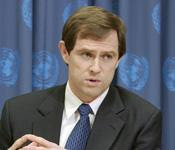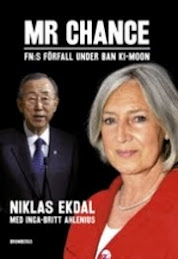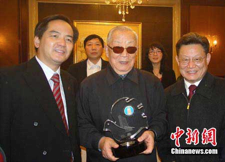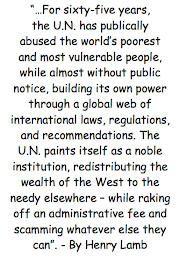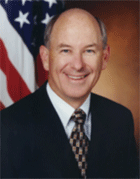Olivier De Schutter, the United Nations Special Rapporteur on the Right to Food, is the author of a report presented on October 20, 2010 to the United Nations General Assembly, which perfectly illustrates the socialist ideology that is all too prevalent amongst United Nations bureaucrats and its so-called ‘experts.’
The report constitutes little more than an assault on free market capitalism. It is an encomium for government-led wealth redistribution.
In his report, Mr. De Schutter blames the free market system for threatening the livelihoods of “peasants, fishers, pastoralists, and indigenous peoples.” He emphasizes “the importance of land redistribution for the realization of the right to food.”
A “right to work,” right to communal property, adequate housing
Beyond “the realization of the right to food” itself - which was supposed to define the limit of his area of responsibility - Mr. De Schutter contends that there should also be recognition of universal human rights to “adequate housing,” a “right to work (for landless peasants),” and last, but not least, a human right to land. The right to land, he claims, includes “the right to communal property — a right of the community rather than of the individual” as “an alternative to individual property rights.”
Mr. De Schutter contends that speculation on farmland, the expansion of agrofuels production, and demographic growth in rural areas are all contributing to what he calls “global enclosures” concentrated in the hands of the few. He even blames land ownership concentration on the effect of measures intended to combat global warming that other UN experts and bureaucrats have been championing.
“Measures adopted with a view to climate change mitigation or environmental conservation, which have placed priority on technological and market-based solutions over the deconcentration of land in order to encourage more sustainable land uses,” Mr. De Schutter writes in his report, “have created further conflicts with the rights of land users.”
He demands urgent action to reverse “inequitable” distribution of land. “Land does not go to those who need it most,” Mr. De Schutter told reporters at a briefing at UN headquarters in which he discussed his report.
According to this UN ‘expert,’ capitalist notions of private property and the titling process tend to reinforce the unequal distribution of land, unfairly favoring those who have access to capital and whose ability to purchase land is greatest.
“Rather than focusing on strengthening the rights of landowners, States should encourage communal ownership systems, strengthen customary land tenure systems and reinforce tenancy laws to improve the protection of land-users,” says Mr. De Schutter.
But “communal ownership systems” - or what used to be called collective farms in the old Communist Soviet Union - may not be enough, according to Mr. De Schutter. He believes that radical programs to achieve equitable redistribution of land may be necessary where the concentration of land ownership is considered by government authorities to be so high as to cause widespread hunger. “Systematic change in land rights” is essentially his definition of ‘agrarian reform.’
The UN’s Special Rapporteur on the Right to Food advises that “[T]he best way to ensure the right to land and the right to food is precisely to democratize and to secure access to land for the benefit of smallholders. The conclusion is clear: access to land must be recognized as a critical human rights issue.”
If those desiring to use someone else’s land happen to take the law in their own hands and occupy land which they do not own, Mr. De Schutter is fine with that. “The non-violent occupation of land by landless movements should not be criminalized,” he writes in his report.
In response to my question at his press briefing, Mr. De Schutter shared a couple of his suggestions with reporters about how governments can best redistribute land. One of his suggestions was to tax large landowners at such a high rate that they will be incentivized to sell their land to small farmers at below market rates. Another suggestion of his was for the government to simply expropriate land from large landholders if the government does not believe that the land is being used productively.
The bottom line for Mr. De Schutter is that “State-led agrarian reforms” (i.e., government-enforced land redistribution) are preferable to “market-led agrarian reforms.”
And, says this UN czar, where UN member states fail to establish land redistribution schemes, “they should provide justifications for not having done so.”
To whom should these justifications be submitted for review? Mr. De Schutter wasn’t very specific, except to suggest some sort of global governance structure:
“International human rights bodies should consolidate the right to land and take land issues fully into account when ensuring respect for the right to adequate food. The Committee on Economic, Social and Cultural Rights could play a leading standard-setting role in clarifying the issue of land as a human right by issuing a general comment in that regard. Acting in their monitoring capacity, human rights bodies should examine the justifications offered by Governments that fail to put in place land redistribution programmes or policies with similar aims, despite the existence of a high degree of concentration of land ownership, combined with a significant level of rural poverty attributable to landlessness or inequitable land distribution.”
The United Nations Committee on Economic, Social and Cultural Rights is one of those unaccountable UN bodies of “independent experts” that monitors the implementation of a UN treaty by its state parties. In this case, the treaty is known as the International Covenant on Economic, Social and Cultural Rights, which the United States ratified back in 1977 during Jimmy Carter’s thankfully short presidency.
The “Covenant” itself is simply an expression of goals and aspirations of the member states toward which they pledged to work. It provides for “international assistance and cooperation” toward the improvement of basic conditions in the member states, while leaving it up to each member state to devise its own legislative measures as it deemed appropriate. The Covenant contains no compulsory enforcement provisions. Nor does it provide a basis for interference in the political or judicial mechanisms of each member state.
Enter the United Nations Committee on Economic, Social and Cultural Rights, which took it upon itself the right to issue its own interpretation of the provisions of the Covenant. The committee took the general aspirational language of the Covenant and filled in the gaps with its own specific “elements” such as which groups had standing as aggrieved parties, the “entitlements” ensuing from each right, and the “justiciable” aspects of each right.
For example, the committee expounded on the Covenant’s “recognition” of a “core right” to adequate housing as including much more than basic habitability. The committee in its infinite wisdom concluded that “(A)dequate housing must be in a location which allows access to employment options, health-care services, schools, child-care centres and other social facilities.” Moreover, the committee warned, “thebuilding materials used and the policies supporting these must appropriately enable the expression of cultural identity and diversity of housing.”
The committee went far beyond anything found in the actual Covenant itself by claiming that the “right to housing should be ensured to all persons irrespective of income or access to economic resources” and instructed the state parties to “establish housing subsidies for those unable to obtain affordable housing.”
One wonders how many of the members of the United Nations Committee on Economic, Social and Cultural Rights have actually built a house or a business or have risked their own capital to develop land for productive use. Yet it is this unaccountable body, trumpeting their own interpretations of treaty provisions as if those interpretations were to have any binding effect on the member states, to which the UN’s Special Rapporteur on the Right to Food would turn for enforcing his notion of a ‘human right’ to someone else’s land.
Socialism and global governance go very much hand in hand at the United Nations.
Joseph A. Klein is the author of a new book entitled Lethal Engagement: Barack Hussein Obama, the United Nations and Radical Islam.




